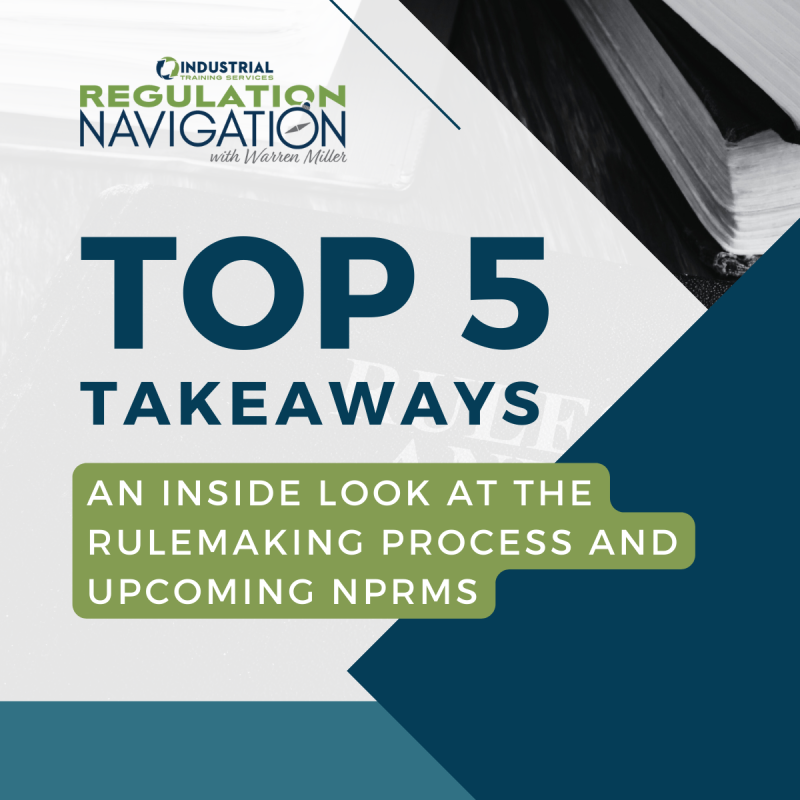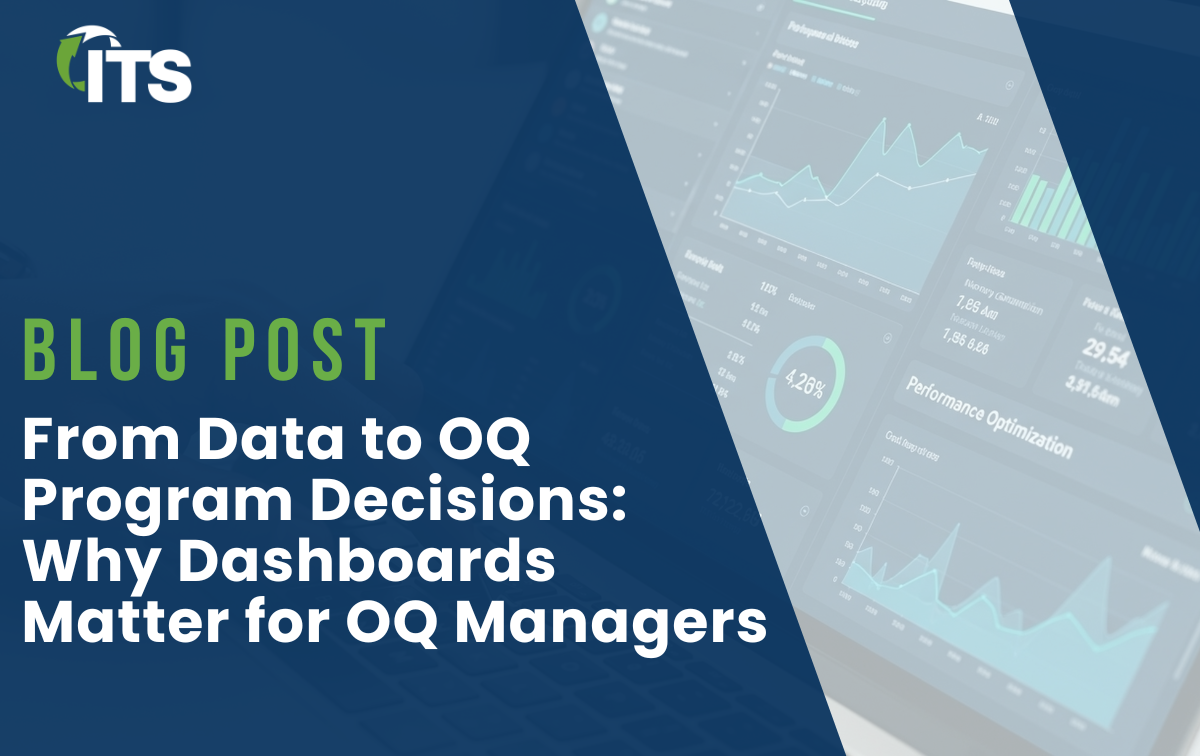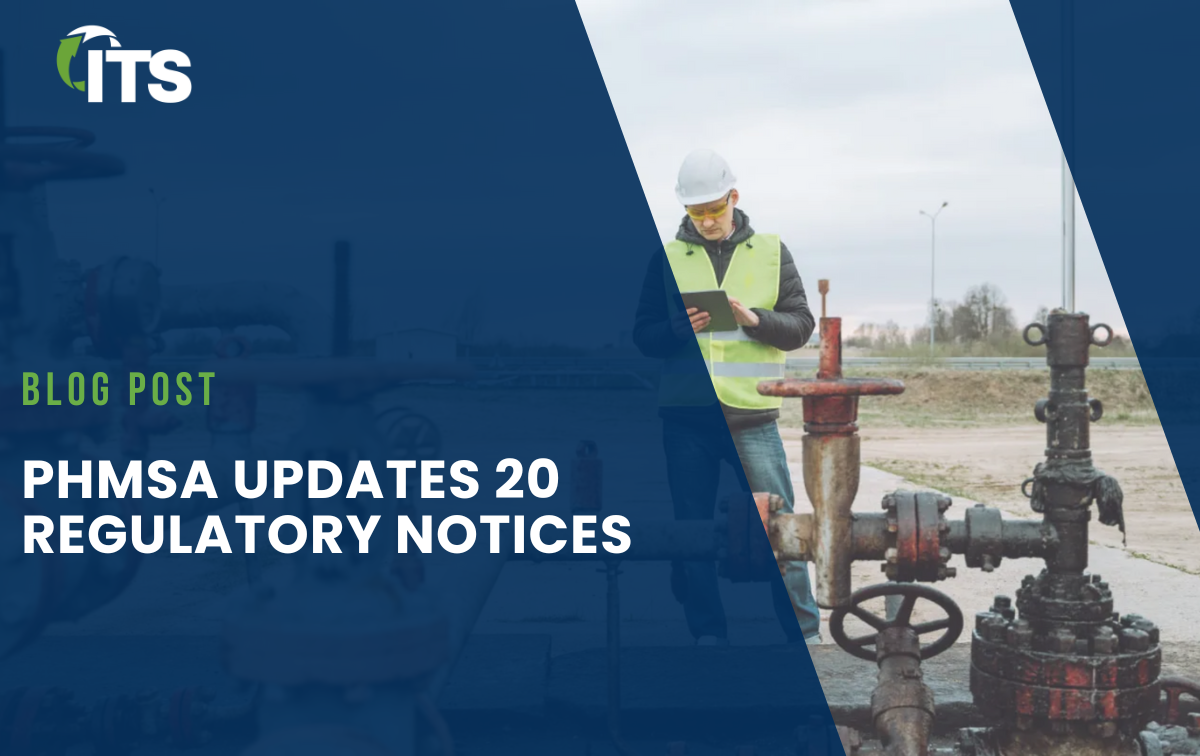May 26, 2023
Many voices are involved in developing Pipeline and Hazardous Materials Safety Administration (PHMSA) regulations, and pipeline operators and contractors should be among them. These federal rules shape how work is done on natural gas and hazardous liquid pipelines.
Our latest Regulation Navigation webinar covered how PHMSA final rules are made and regulations that are in the works for the energy industry.
Whether you missed the webinar or would like a quick refresher, read on for the Top 5 Takeaways:
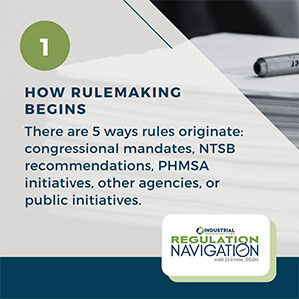 There are 5 ways rules originate: congressional mandates, NTSB recommendations, PHMSA initiatives, other agencies, or public initiatives.
PHMSA uses the mandate, recommendation, or initiative to create the Notice of Proposed Rulemaking, or NPRM.
There are 5 ways rules originate: congressional mandates, NTSB recommendations, PHMSA initiatives, other agencies, or public initiatives.
PHMSA uses the mandate, recommendation, or initiative to create the Notice of Proposed Rulemaking, or NPRM.
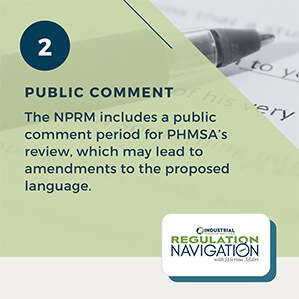 The NPRM includes a public comment period for PHMSA’s review, which may lead to amendments to the proposed language. The public comment period allows interested groups and individuals to give their feedback on the proposed regulation.
The NPRM includes a public comment period for PHMSA’s review, which may lead to amendments to the proposed language. The public comment period allows interested groups and individuals to give their feedback on the proposed regulation.
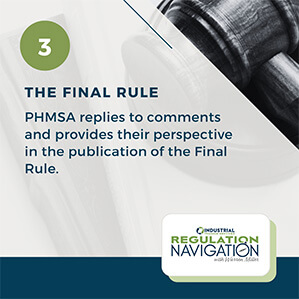 PHMSA replies to comments and provides their perspective in the publication of the Final Rule. PHMSA may not act upon recommendations from public comment, but the Final Rule includes the agency’s justification and reasoning for including or excluding suggested changes.
PHMSA replies to comments and provides their perspective in the publication of the Final Rule. PHMSA may not act upon recommendations from public comment, but the Final Rule includes the agency’s justification and reasoning for including or excluding suggested changes.
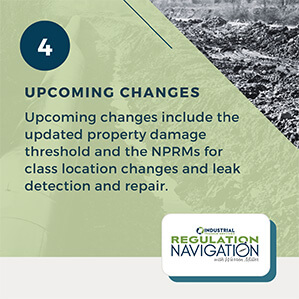 Upcoming regulatory changes include the updated property damage threshold and NPRMs for class location changes and leak detection and repair.
Upcoming regulatory changes include the updated property damage threshold and NPRMs for class location changes and leak detection and repair.
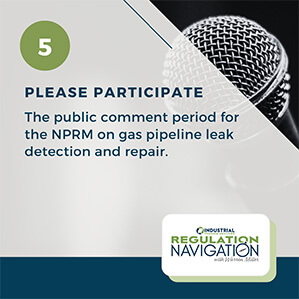 Please participate in the public comment period for the NPRM on gas pipeline leak detection and repair. If you have any concerns or suggested changes to the NPRM on gas pipeline leak detection and repair, share those with PHMSA by commenting on the NPRM.
If you have questions or concerns about how PHMSA regulation changes might impact your company or are interested in learning more about our range of regulatory consulting services, please contact ITS Regulatory Compliance Specialist Warren Miller to learn more about how we can help you meet your compliance needs.
Please participate in the public comment period for the NPRM on gas pipeline leak detection and repair. If you have any concerns or suggested changes to the NPRM on gas pipeline leak detection and repair, share those with PHMSA by commenting on the NPRM.
If you have questions or concerns about how PHMSA regulation changes might impact your company or are interested in learning more about our range of regulatory consulting services, please contact ITS Regulatory Compliance Specialist Warren Miller to learn more about how we can help you meet your compliance needs.
 There are 5 ways rules originate: congressional mandates, NTSB recommendations, PHMSA initiatives, other agencies, or public initiatives.
PHMSA uses the mandate, recommendation, or initiative to create the Notice of Proposed Rulemaking, or NPRM.
There are 5 ways rules originate: congressional mandates, NTSB recommendations, PHMSA initiatives, other agencies, or public initiatives.
PHMSA uses the mandate, recommendation, or initiative to create the Notice of Proposed Rulemaking, or NPRM.
 The NPRM includes a public comment period for PHMSA’s review, which may lead to amendments to the proposed language. The public comment period allows interested groups and individuals to give their feedback on the proposed regulation.
The NPRM includes a public comment period for PHMSA’s review, which may lead to amendments to the proposed language. The public comment period allows interested groups and individuals to give their feedback on the proposed regulation.
 PHMSA replies to comments and provides their perspective in the publication of the Final Rule. PHMSA may not act upon recommendations from public comment, but the Final Rule includes the agency’s justification and reasoning for including or excluding suggested changes.
PHMSA replies to comments and provides their perspective in the publication of the Final Rule. PHMSA may not act upon recommendations from public comment, but the Final Rule includes the agency’s justification and reasoning for including or excluding suggested changes.
 Upcoming regulatory changes include the updated property damage threshold and NPRMs for class location changes and leak detection and repair.
Upcoming regulatory changes include the updated property damage threshold and NPRMs for class location changes and leak detection and repair.
- The new threshold for property damage caused by gas pipelines is $139,000.
- The class location change is likely to become a Final Rule since the NPRM was released in October 2020.
- The largest potential impact on the industry is the NPRM for gas leak detection and repair; this regulation was created to reduce methane emissions as called for in the PIPES Act of 2020.
 Please participate in the public comment period for the NPRM on gas pipeline leak detection and repair. If you have any concerns or suggested changes to the NPRM on gas pipeline leak detection and repair, share those with PHMSA by commenting on the NPRM.
If you have questions or concerns about how PHMSA regulation changes might impact your company or are interested in learning more about our range of regulatory consulting services, please contact ITS Regulatory Compliance Specialist Warren Miller to learn more about how we can help you meet your compliance needs.
Please participate in the public comment period for the NPRM on gas pipeline leak detection and repair. If you have any concerns or suggested changes to the NPRM on gas pipeline leak detection and repair, share those with PHMSA by commenting on the NPRM.
If you have questions or concerns about how PHMSA regulation changes might impact your company or are interested in learning more about our range of regulatory consulting services, please contact ITS Regulatory Compliance Specialist Warren Miller to learn more about how we can help you meet your compliance needs.
